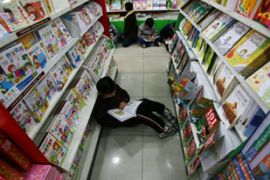China ‘regrets’ WTO media ruling
Beijing considers appealing decision against its restrictions on foreign media imports.

“The channels for China’s import market for published materials, movies and music are completely unimpeded,” he continued.
China has said its media controls, which see such products routed through state-owned companies, is needed to ensure removal of offensive content and protect public morals.
Its ruling Communist Party sees its control over content of movies, music, books and other media as a tool to protect its political power.
Trade dispute
Wednesday’s ruling was the latest development in a trade dispute with the US, which brought the complaint to the global trade watchdog in 2007.
The two countries have argued over access to each other’s markets for goods, ranging from tires to poultry.
Ron Kirk, a US trade representative, said the WTO decision was a “significant victory” to his country’s creative industries.
“These findings are an important step toward ensuring market access for legitimate US products in the Chinese market, as well as ensuring market access for US exporters and distributors of those products.”
Beijing agreed when it joined the WTO in 2001 to treat foreign and domestic companies equally.
But foreign firms in a range of industries have complained that they face barriers to imports and investment.
‘Highly restricted’
Earlier this year, the US chamber of commerce said: “Distribution of foreign films remains highly restricted, with some internationally top grossing movies unauthorised for domestic distribution”.
“China stands to gain from greater film distribution in many ways, including better development of the indigenous film industry and reduction in demand for pirated movies as legitimate access to international titles is increased.”
Wednesday’s WTO ruling said Beijing should allow foreign companies to distribute master copies of books, magazines and newspapers to customers in China;
wholesale electronic publications and receive the same conditions and charges as Chinese companies for distributing reading materials.
But it added that China may continue to route imported films through one of two government-designated distributors – a condition that does not apply to Chinese titles.
The ruling also rejected Washington’s argument that Chinese censorship of music hampered sales.